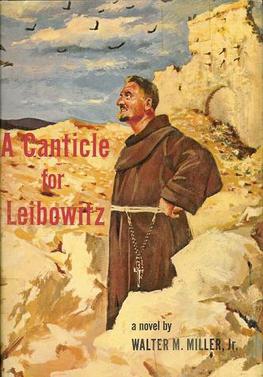 A Canticle For Leibowitz (1960) by Walter M Miller Jr.
A Canticle For Leibowitz (1960) by Walter M Miller Jr.I have been wanting to revisit this book now for a number of years as I explore the post-apocalyptic literature genre. I know I read it as a teen but really had no memory of what it was about at all. A Canticle For Leibowitz was something of a one hit wonder in that this book was a huge hit for Miller and other than a forgotten sequel written years later he never wrote another novel. Miller was a prolific writer of short stories and contributed to many of the early sf magazines. Canticle is actually three short stories that he repackaged with some adjustments as a novel.
In fact, the structure brought to mind a series of paintings that I was recently introduced to by a friend, The Course of Empire by Thomas Cole. The paintings depict the rise and fall of a city from a "savage" state through its rise and eventual destruction to desolation. Canticle begins after a nuclear apocalypse - the Flame Deluge - where monks of the Albertian Order of Leibowitz have an abbey in the desert. The monks have struggled to preserve the fading knowledge of a the once great civilization of the ancients. Faced with the constant danger of extremists who believed that exposure to knowledge of the ancients would cause another chaotic world event, they had to secure this information of the ancients; often risking their lives to save it.
The novel explores a number of themes including church v state, religion v science, limitations of technology, and others. At times, the more abstract side of the writing especially about religion can become a bit tedious. It's not proselytizing but the author certainly wants to get deep into it. In the end the message is that information is our most precious resource (quite relevant today). Although perhaps not the most readable book ever but certainly well worth for any fan of classic sf or good writing.

1 comment:
That cover is by far one of the few that actually represents somewhat what is going on in the book. I think that's the thing that threw me the most, now that I read your review, is that I did not expect this book to be about a monk in a monastery.
Post a Comment